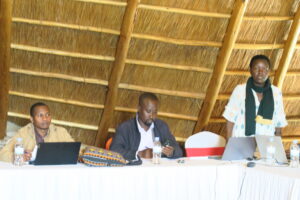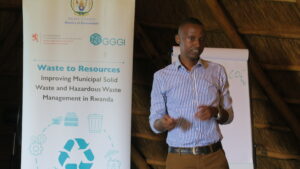28 November -1 December 2023, Rubavu, Rwanda – The Waste to Resource Project : Improving Municipal Solid Waste and Hazardous Waste Management in Rwanda led by the Ministry of Environment of the Government of Rwanda and funded by the Ministry of Environment, Climate and Sustainable Development of the Government of the Grand Duchy of Luxembourg, aims to valorize organic and plastic waste; increase collection of electronic waste; and increase community awareness, build capacity, and improve the policy and regulatory environment for circular economy initiatives in the waste sector. By strengthening the capacity of key actors and incorporating technological approaches to sustainable waste management, the project aims:
1) to reduce the untreated waste collected at the landfill site,
2) create revenue-generating business models from existing waste streams to create green jobs,
3) increase access to sustainable services for residents in the City of Kigali, and
4) reduce GHG emissions from the waste sector.
From 28 -29 November 2023 ,the Global Green Growth Institute (GGGI) organized a training on Greenhouse Gas (GHG) Emission Modeling and Accounting for Government counterparts in waste sector, under the Waste to Resources: Improving Municipal and Solid Waste and Hazardous Waste Management in Rwanda, from 28th – 29th November 2023, at Galaxy Kivu Hotel, Rubavu.
The aim of the training was to empower Government counterparts in the waste sector to contribute effectively to sustainable waste management initiatives by enhancing their capacity in GHG emission modeling and accounting. This encompasses, among other objectives:
- Providing participants with a comprehensive understanding of key terminology related to greenhouse gas (GHG) emissions and introducing them to the GHG waste inventory.
- Developing participants’ skills in collecting data in the correct format and frequency, ensuring the accuracy and reliability of data for GHG inventory purposes.
- Enabling participants to practically apply their knowledge by conducting baseline calculations and engaging in exercises using different GHG models including the SWEET (Solid Waste Emission Estimation Tools) and IPCC (Intergovernmental Panel on Climate Change) Tools.
With technical staff attending the two day training from Ministry of ICT, Rwanda Development Board, National Industrial Research and Development Agency ,Rwanda Environment Management Authority , Water and Sanitation Corporation , City of Kigali, and officers from Huye District , Muhanga, Rusizi, Musanze, Nyagatare district.
Juvenal Mukurarinda , Project Manager from GGGI Rwanda gave his welcome remarks ,”expressing appreciation to all participants, with acknowledgment for the Technical Working Group (TWG) members and for those from the district tasked with cascading the training impact. He applauded all the participants for their commitment and willingness to learn this new knowledge and be able to use it in their respective roles.”

GGGI Consultant Mr Elisee Gashugi conducted an extensive training session on GHG Emission Modeling & Accounting, designed to provide participants with a thorough understanding of crucial concepts and practical applications. In this foundational session, Elisee explained key terms such as climate change, its attribution to human activities, and the significance of adaptation, resilience, and mitigation and the interconnectedness of these concepts with Sustainable Development Goals (SDGs) was emphasized, establishing a robust framework for subsequent discussions. The participants received training on Data Collection Strategies for GHG Inventory ; GHG Monitoring and Mitigation Strategies ; Practical Exercises (IPCC & SWEET Model) ; Overview of the Carbon Trading under the Article 6 ; GHG Analysis under the Waste to Resources Project. By combining theoretical insights with practical exercises, the session ensured that participants not only understood the concepts but could also apply them effectively. The holistic approach lead by the GGGI consultant Elisee made the training valuable for professionals engaged in climate change mitigation and waste management. The training session concluded with stakeholders engaged in discussions about integrating climate change education and curriculum, acknowledging the challenges at hand and emphasizing the need for substantial progress.
From 30th Nov- 1 Dec 2023 , GGGI Rwanda hosted the 8th Thematic Working Group ,the aim of the TWG meeting is to present, review, and validate the waste to resource project progress against key milestones. These include, among others:
– GHG analysis for the project outcome B for e-waste interventions.
– Progress of the project infrastructure activities, specially design report for bio-waste facilities, reverse vending machines.
– Monitoring, Evaluation and Learning (MEL) framework for the project.
Dismas Karuranga, representing the Ministry of Environment , Rwanda said in his welcome remarks the government of Rwanda is looking forward to the results and impact from the Waste to Resource Project in 2024 , including the infrastructure that has commenced at Nduba Dumpsite, he said hey value to role GGGI is playing in the implementation of the project activities and he encouraged all the project stakeholders to be actively involved in the project progress support to rollout the remaining activities that will encourage behaviour change among the citizens of Rwanda. He added that we have the responsibility to engage with citizens across the country in order for them to become more involved in our national initiatives for awareness of this new infrastructure but also for the public to appreciate the work being done across the country for the Waste To Resource Project”

A productive working group was held with key project stakeholders focusing on strengthening the understanding of GHG emission modeling and accounting, with an in-depth review of project implementation progress ; and identification of key areas for improvement as the project infrastructure commences during December.